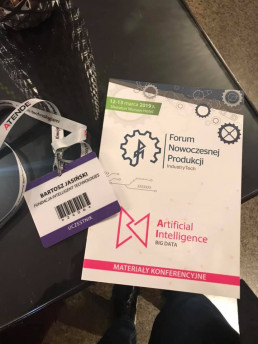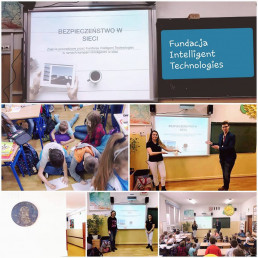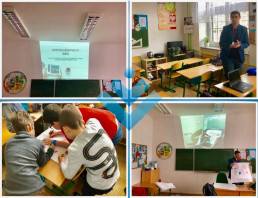Win Instax Mini 11 Camera
🥳We have a surprise for you!
🤩Win Instax Mini 11 Camera 📸. How? It is very easy. What did you and your family like the most about the Im2be app? Leave us a comment with your answer. The most creative answer wins! You have until 03/29/2021 23:59! The award is funded by Intelligent Technologies! 👏
The rules of the competition are available at the link:
competition regulations
Hurry up!
# im2be #poweredbylove #faithinthefamily
How to learn?
One is justified by the surprising form of the test? Or maybe "overlearning" as the main culprit of weakening motivation and low results? This may be the result of incorrect selection of learning strategies and lack of knowledge about how to learn effectively. It is worth knowing what to suggest to a child who is less willing to look at books.
School is focused on learning and acquiring skills. Often, however, students do not know what instruments to use while studying. They use very ineffective methods that can lead to reduced motivation or learned helplessness. In less extreme cases, they simply extend learning time and take away the chance of pursuing a hobby or meeting peers. Fortunately, a parent who knows the basics of the learning process can be a great consultant on effective learning.
An individual approach maximizes profits
This time it is not about the individual approach to the child, but about ... the material to be absorbed. It is worth teaching the child the habit of assessing the content they intend to learn. Are they difficult? Extensive? Can science be exhausting? Depending on the specific material, the optimal method should be chosen. The fact that a lot of time should be reserved for long and difficult material should not come as a surprise. However, a longer working time does not mean longer breaks, on the contrary - the more difficult the content to master, the shorter breaks should be made.
How to remember better?
The fact that a child has problems remembering can mean using an ineffective strategy. Repetition itself can prove itself at the beginning of a career in elementary school, then the complexity of the material requires more sophisticated techniques. When looking for a good strategy, it is worth knowing what improves the process of remembering. First of all, it is independence - doing the task yourself significantly increases the memory achievements compared to the situation of watching the task performed by someone else. Instead of presenting how to solve a math problem, support the child in an independent performance - you can praise him for involvement, ask questions to help organize work or indicate the sources in which he can find help.
Good answers - to recognize and produce
For many students, information about the form of checking knowledge is very important - especially the elders know that you can learn differently to the test with open questions, and differently to the one with answers to choose from. What is the difference? Even if the child only reads his notes, during a closed test, he will probably recognize among the unmasking answers the ones he saw in the texts he read. On the other hand, it may have difficulties in extracting unfixed content from memory and failing on tasks requiring reproduction - that is, giving a creative answer in an open question. Reproduction is a multistage, effort-intensive process that takes place on the basis of traces other than recognition. It is worth realizing to a young adept of science that reading (i.e. relying on image marks) is not equivalent to learning (creating verbal traces).
Bibliography
Jagodzińska, M. (2013). Psychologia pamięci: badania, teorie, zastosowania. Gliwice: Wydawnictwo Helion.
Who can replace the smartphone?
The fast career of smartphones has pulled round many specialists who pay attention not only to the benefits, but also to the risks associated with them. The term “phonoholism” or addiction to the phone, quickly gained popularity. However, it is worth knowing what the more subtle symptoms of the incorrect relationship with the phone are - and how to respond to them.
Friendship or toxic relationship?
It is difficult today to expect a child to only use analog toys. In the end, he observes parents who are replying to emails with their smartphone, making appointments to the doctor and paying bills. Vibrating the phone reminds you to drink a glass of water or make birthday wishes. In many cases, a smartphone is a convenient and quick way to manage our reality - an important task for a parent is to teach their children how to use their phone wisely. What if you use it in real needs? Such as:
• a reminder for the test at school,
• instant messaging contacts with friends,
• maybe some photo editing application for a small fan of graphics and photos,
• learning languages, learning about new cultures.
They will be useful for sure. It is important, however, that a young smartphone user, bewitched by his abilities, does not allow his / her addiction to be completely dependent on a flat screen. It is worth talking to your child if the phone will actually make it easier for him to learn or to pursue his passion or to fill time with no benefits.
How many hours means addiction?
The time the child spends with the phone in front of his eyes is not always reliable information on whether his relationship with the smartphone is within the normal range or whether he should pay attention to the parent. It will not be a bad thing either, if the daughter once happens to sink in the blue screen for the whole afternoon, watching photos of the rarest Asian toads. When an eleven-year-old, tired after a very hard day, throws himself on the bed and slides his finger across the screen, we can assume that he really has no strength at all for anything else. However, if it begins to become his everyday life, and a few hours a day with a smartphone is a new tradition, it will be useful to talk about why the phone has become so important.
Phone-therapist...
If the child regularly begins to spend more time sunk in the blue screen, his smartphone can barely cope with the number of applications downloaded, and other areas of life (learning, friends, home duties) begin to go down into the background, it is worth to intervene. It may be helpful to reach the cause of the change in behavior. Some children spend a lot of time with the phone because they cannot organize their own time - instead of planning activities, they count the next steps of the favorite game. Those little ones who started using the phone early may be used to flickering effects on the screen and to quickly change the composition, which is why fewer stimulating ways to spend time may seem boring to them.
... and Parent-Lifeguard
Cutting off the access to the network or setting an hour a day to use the phone will not solve the problem - because the phone is often only a way to express the problem, but it is not in itself. It is worth teaching a child to actively solve problems or creative organization of time, and technology should be treated as facilitating the implementation of needs. Thanks to this, the child will be able to enjoy its benefits without risking that the digital world will keep it too deep.
Speak like children - why do not children understand us?
Sometimes you have to repeat something twice. The noise in the next room, poor coverage, temporary articulation indisposition caused by an unexpected yawn? Peanuts. It's frustrating when you say something with a smile, and you do not see any sense of understanding. You say something for the third time, slowly and clearly, and the child looks as if he saw you for the first time. How to get rid of the superpower of invisibility and talk so that the child understands?
Simple solution
The ability to understand increasingly complex content develops with age and the richness of speech. Therefore, from the first days of life it is worth talking to a child (speech in case babies develops only in contact with another person! Songs for children and audiobooks with fairy tales will not help in that case). As you grow up, it is worth giving a good example, using a varied language and creating the opportunity to learn new words. However, when we come to fulfill duties or situations requiring concentration, we all prefer simple messages. Instead of a lengthy monologue full of stylistic figures and digression, it is better to hear three sentences full of content, but in a cost-effective form. Children are radical fans of simple messages.
Polite - what it means?
In our adult minds, certain words, even if not necessarily transparent and understandable, can be given meaning, which makes them useful in conversation. Everyone has a general idea of what the word "polite" means, although the word is very broad. For some, cleaning up may be more important in politeness, for others opening doors to women or giving way to the elderly. Often this word is simply adapted to the situation.
Do not do it here. Do it somewhere else
Bans that are to be a hint for a child's behavior can also be embarrassing. The behavior to which we try to discourage the child is worth replacing with another, more adequate. If you are taking your child away a possibility to do something, offer him another one. A careful parent warns "Do not wipe your hands on your pants." Okay, so what? There is also a tablecloth. "Wipe your hands on a napkin, lie on the table" is much more helpful.
Formulating appropriate, adequate for the child's ability and age, messages not only save time and avoid frustration, which in the event of a misunderstanding will affect both sides. It is also an easy way to avoid banning your child. By dressing our advice in the form of tips, and not sentences starting with "No", the child will avoid the impression that everything is wrong - but it will be able to take our advice as help and support.
X AI&BigData Congress
Our Foundation received an invitation to X AI & BigData Congress, which took place on 12th and 13th of March. The event was dedicated to artificial intelligence in the modern world. Thanks to the courtesy of MMConferences S.A. we could learn different methods of using Artificial Intelligence and Machine Learning and learn more about their future on the Polish market.
Thank you for the inspirational event that can be implemented in our projects.
Conference "Children in the Web. Safe and responsible use of Internet resources"
During today's conference "Children in the Web. Safe and responsible use of Internet resources "we have deepened our knowledge of the use of modern technologies and their impact on children and adolescents. It was very inspiring!
Workshops at the Primary School No. 293 in Warsaw
Next workshops are behind us! Today we visited students from Jan Kochanowski Primary School No. 293 in Warsaw and we talked about security in the web. We thank to classes 4d and 4e for joining the "Safer Internet Day 2019" campaign.
Workshops as part of the Safer Internet Day celebrations
Nowadays, threats are lurking everywhere! Also, in the web! By joining the campaign "Safer Internet Day 2019" we went to visit the students of Powstańców 1863 Primary School No. 30. Thank you, class 3 a, for the creative workshops on Internet security! You were wonderful!
Safer Internet Day
Safer Internet Day - today we had the pleasure to participate in the conference organized as part of the celebration of this Day. This year, everything takes place under the slogan "Safer Internet Day: Let's act together!". It was very inspiring. February is a special month for us, because it is a time to promote responsible use of new technologies. We encourage you to familiarize yourself with this initiative.
Multikino once again
On 22nd and 25th of January, we conducted another workshop as part of the "Intelligence in the Web" project on cyber security in Multikino. The students surprised us with their vast knowledge. Thank you for invitation!






